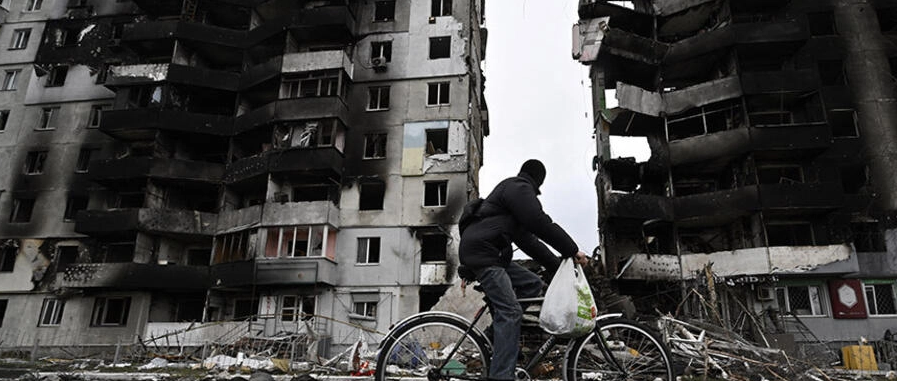
STRATEGIC ASSESSMENT. The United States supports Canada’s decision to return a repaired turbine to Germany that is needed for the Nord Stream 1 gas pipeline, the State Department said on Monday, a move aimed at ensuring continued flows of energy to Europe amid shortages that followed Russia’s invasion of Ukraine.
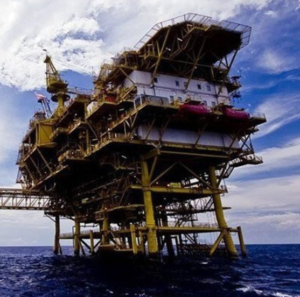
“In the short term, the turbine will allow Germany and other European countries to replenish their gas reserves, increasing their energy security and resiliency and countering Russia’s efforts to weaponize energy,” department spokesman Ned Price said in a statement.
Senate Republicans are lining up to back Minority Leader Mitch McConnell as he threatens to tank multi-billion-dollar legislation aimed at confronting China, imperiling what initially appeared on track to join this Congress’ biggest bipartisan achievements.
McConnell’s threat, sent via tweet while senators were away from Washington, was aimed at derailing Democrats’ fledgling efforts to revive their party-line tax and climate bill, which all Republicans are expected to oppose.
Although the Kentucky Republican supported the U.S.-China competition bill, known by some as USICA, he’s now vowing to block it if Democrats move forward with their separate legislation. The move jostled lawmakers from both parties. But even Republicans who toiled on the now-at-risk competitiveness bill are behind him.
The United States has unveiled a major push into the Pacific region, seeking to counter China’s growing influence, with Vice President Kamala Harris announcing $600 million in funding at a key regional summit.
In a video address to the Pacific Islands Forum (PIF) in Fiji on Wednesday, Harris also said the US would open two new embassies – in Tonga and Kiribati – and appoint its first-ever envoy to the Pacific. It has already announced plans to reopen its embassy in the Solomon Islands.
The US vice president thanked Fiji for inviting her to speak at the summit and said the US was ready to “embark on a new chapter” in the Pacific. Harris said she and US President Joe Biden acknowledged the region may not have received enough focus in the past. “We are going to change that,” she promised, adding the US wanted to “significantly deepen our presence in the Pacific region”.
In a statement by the U.S. Embassy in Manila on Tuesday, U.S. Secretary of State Antony Blinken called on China to comply with a 2016 arbitration ruling that invalidated Beijing’s vast territorial claims in the South China Sea and warned that Washington is obligated to defend treaty ally Philippines if its forces, vessels, or aircraft come under attack in the disputed waters.
A bipartisan group of senators wants to impose stricter rules on consultant companies seeking federal contracts, requiring them to disclose if they are carrying out work advising foreign adversaries including China and Russia.
The senators are proposing legislation that would mark a new approach in Washington after years of minimal regulation of firms that advise the Pentagon or other federal agencies on national security-related contracts, according to government watchdog groups.
The bill, which was introduced Wednesday, calls for new regulations that would help government agencies identify potential conflicts of interest within consulting firms or other government contractors and, if necessary, deny the firms from being awarded national security-related contracts.
The nation’s top general has ordered his staff to gather information about every interaction between the U.S. military and the Chinese military over the past five years to review the growing number of interactions with the Chinese military in the South China Sea and beyond, say three defense officials.
The order from Gen. Mark Milley, chairman of the Joint Chiefs of Staff, came after a video teleconference call between Milley and his Chinese counterpart on July 7, the officials said. During the call, Gen. Li Zuocheng, the chief of the Joint Staff Department for the People’s Liberation Army of China, disputed the U.S. contention that there has been an uptick in aggressive behavior by Chinese military aircraft and ships against U.S. and allied military operating in international waters that the Chinese view as their own territorial areas.
In the official readout of the call between Milley and his counterpart, which was made public on July 7, Milley’s spokesperson, Col. Dave Butler, said Milley “underscored the importance of the People’s Liberation Army engaging in substantive dialogue on improving crisis communications and reducing strategic risk,” but did not provide more detail about the strategic risks.
Joe Biden is once again appealing to Congress to go further with gun safety legislation and ban assault weapons in the US.
In remarks at the White House moments ago he included a vivid indictment of the proliferation of military-style assault weapons among the general public in recent years and how they repeatedly feature in mass shootings.
“We are living in a country awash in weapons of war,” the US president said. “Weapons that are designed to hunt are not being used [in massacres], weapons they are purchasing are designed as weapons of war, to take out an enemy.
What is the rationale for these weapons outside war zones? Some people claim it’s for sport or to hunt,” he continued in front of an estimated audience of about 300 people on the South Lawn of the White House.
“But let’s look at the facts,” he said. Biden spoke of bullets fired from an assault rifle moving twice as fast as bullets fired from handguns and “maximize the damage done” to people. “Yet we continue to let these weapons be sold to people with no training or expertise,” he said.
Mexico on Tuesday pledged to spend $1.5 billion in beefing up its borders as its leader met with U.S. President Joe Biden, who faces attacks from Republicans over his handling of immigration on the United States’ southern flank.
Casting immigration as a “hemispheric challenge”, Biden met Mexican President Andres Manuel Lopez Obrador and top Mexican officials in the White House to address U.S. concerns over migration and Mexico’s desire for more worker visas.
In a joint statement, the two governments vowed to take “immediate and coordinated steps to manage the flows of migrants arriving into our countries” and to tackle soaring inflation by boosting bilateral trade and reducing trade costs.
The meeting came a month after Lopez Obrador skipped the U.S.-hosted Summit of the Americas in Los Angeles to protest Biden’s decision to exclude the leftist governments of Cuba, Venezuela and Nicaragua.

U.S. Treasury Secretary Janet Yellen and Japanese Finance Minister Shunichi Suzuki agreed on Tuesday to work together to address rising food and energy prices, as well as volatility in currency markets, exacerbated by Russia’s war in Ukraine.
They said the war had increased exchange rate volatility, which could have adverse implications for economic and financial stability, and pledged to “cooperate as appropriate” on currency issues in line with their commitments as part of the Group of Seven and Group of 20 economies.
“We will continue to consult closely on exchange markets and cooperate as appropriate on currency issues, in line with our G7 and G20 commitments,” the two sides said in a joint statement following their meeting.
en. Joe Manchin and his staff told Senate Majority Leader Chuck Schumer and his staff “unequivocally” on Thursday the West Virginia Democrat won’t support the climate or tax provisions of a Democratic economic package that the two had been negotiating for months, according to two sources familiar with the talks.
Schumer, a New York Democrat, made a number of concessions to pare back the climate provisions but Manchin would not budge.
Manchin told Schumer he will not support a bill this month with any provisions on energy or climate, or consider raising taxes on the wealthy or corporations, which represents a massive blow to President Joe Biden’s legislative agenda ahead of November’s midterms.
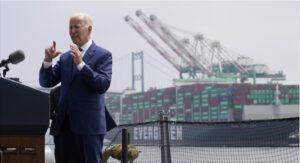
U.S. President Joe Biden lands in the Middle East on Wednesday for a trip that will see Israeli leaders urge tougher action against Iran, before a delicate stop in Saudi Arabia. The 79-year-old president’s visit to Jeddah on Friday will be the focus of the tour, after Biden branded Saudi Arabia a “pariah” over the 2018 murder of dissident Saudi journalist and U.S. resident Jamal Khashoggi.
Air Force One will also make an unprecedented direct flight between the Jewish state and the conservative Gulf kingdom that does not recognize its existence. Before that, Biden will meet Israeli leaders seeking to broaden cooperation against Iran, and Palestinian leaders frustrated by what they describe as Washington’s failure to curb Israeli aggression.
In Palau, the Pacific Partnership 2022 (PP22) team, comprised of representatives from Australia, Japan, the United Kingdom, and the United States, will work together with their counterparts on a range of activities and projects, specifically related to humanitarian assistance, disaster relief, and medical exchanges.
U.S. Ambassador to Palau John Hennessey-Niland noted that “Pacific Partnership reflects our deep commitment to the people of Palau and the region. We welcome the opportunity to work and learn from one another as we continue to work for a Free and Open Indo-Pacific.”
PP22 activities are coordinated with the host nation and are conducted based on Palau’s requirements and requests. Engagements in Palau include medical subject-matter-expert exchanges related to pediatric care, maternity care, neonatal care, intensive and critical care, mental health for military veterans, and physical therapy.
In an interview with Israel’s Channel 12 TV broadcast on Wednesday, U.S. President Joe Biden insisted he would only use force as a last resort to prevent Iran from getting nuclear weapons. Biden said he would include Iran’s Islamic Revolutionary Guard Corps (IRGC) on the U.S. list of Foreign Terrorist Organizations (FTOs) even if the move could nullify the 2015 Iran nuclear deal.
Sen. Joe Manchin’s (D-W.Va.) decision to move ahead with a reconciliation deal that doesn’t involve climate change risks consigning the entire world to a warmer future, scientists, Democrats and advocates said Friday in reacting to the news.
Democratic senators for about a year have been negotiating with Manchin to try to get him on board with investments that would dramatically reduce U.S. contribution to climate change. Manchin, relaying a discussion he’d had telling Majority Leader Charles Schumer (D-N.Y.) of his decision, suggested he might be able to agree to a deal at a later date.
The US and Russia have struck a deal to fly each other’s astronauts to the International Space Station, an apparent break in tensions between the nations over the war in Ukraine that includes the removal of the Russian space program’s bellicose leader.
Nasa and Russia’s space agency, Roscosmos made the announcement of integrated flights Friday, shortly after Moscow said President Vladimir Putin had replaced Dmitry Rogozin with the less confrontational Yuri Borisov, the country’s deputy prime minister and a former minister of defense.
The agreement will see US astronaut Frank Rubio joining cosmonauts Sergey Prokopyev and Dmitry Petelin on a launch aboard a Soyuz rocket from Kazakhstan in September; and Anna Kikina, the only active female cosmonaut, flying with two Americans and a Japanese astronaut on a SpaceX Crew Dragon flight from Florida’s Kennedy space center the same month.
The United States will impose harsh consequences on countries that break the international economic order, Treasury Secretary Janet Yellen said on Tuesday. “Economic integration has been weaponised by Russia,” she said, calling for all responsible countries to unite in opposition to Russia’s war in Ukraine.
The United States is pushing for increased trade ties with South Korea and other trusted allies to improve the resilience of supply chains, and avert possible manipulation by geopolitical rivals, Yellen told Reuters on Monday.
Democratic Majority Leader Chuck Schumer said the US Senate would begin voting on Tuesday on legislation to boost the US semiconductor industry and improve competitiveness with Beijing, including restricting some firms from expanding manufacturing capacity in China. “We need to move quickly,” he said on Monday as the Senate opened for the week.
The legislation is a slimmed-down version of a bill that members of Congress have been working on for well over a year, expected to include US$52 billion in subsidies for the industry and a tax credit for companies that manufacture semiconductors in the United States. “Without these incentives from Congress, the capital investment required for expanding production is not economically viable in the United States, given other global alternatives,” Schumer said.
The United States has successfully tested a Raytheon Technologies Corp air-breathing hypersonic weapon capable of speeds faster than five times the speed of sound, making it the third successful test of that class of weapon since 2013, the Pentagon said in a statement on Monday.

“Advancing our nation’s hypersonic capabilities is a critical national imperative, and this was an important step forward. Having back-to-back successful flight tests gives us even greater confidence in the technical maturity of our HAWC prototype,” Wes Kremer, president of Raytheon’s Missiles & Defense business unit, said.
The United States and its global rivals are increasing their pace to build hypersonic weapons – the next generation of arms that rob adversaries of reaction time and traditional defeat mechanisms. Hypersonic weapons travel in the upper atmosphere at speeds of more than five times the speed of sound, or about 6,200 kilometers (3,853 miles) per hour.
President Joe Biden signed an executive order on Tuesday that codifies a 2020 law dealing with Americans held hostage or wrongfully detained abroad. Drawing on the 2020 Robert Levinson Hostage Recovery and Hostage-Taking Accountability Act, the new executive order will reinforce the U.S. government’s efforts to support families of Americans wrongfully detained or held hostage overseas, according to the White House.
The order will authorize the federal government to impose financial sanctions on those who are involved — directly or indirectly — in wrongful detaining Americans abroad, the White House said. Moreover, government agencies will be directed to improve engagement with those Americans’ families, including sharing intelligence information about their loved ones and the government’s efforts to free them.
The order will also charge experts across agencies with developing “options and strategies to deter future hostage-takings,” the White House said. In addition to the executive order, Biden will introduce a new “risk indicator” – “the ‘D’ indicator” – to the U.S. Department of State’s travel advisories for particular countries to alert Americans of the risk of wrongful detention by a foreign government, according to the White House.
The Reuters Institute revealed last month that 42% of Americans actively avoid the news at least some of the time because it grinds them down or they just don’t believe it. Fifteen percent said they disconnected from news coverage altogether. In other countries, such as the UK and Brazil, the numbers selectively avoiding it were even higher.
“In the United States, those who self-identify on the right are far more likely to avoid news because they think it is untrustworthy or biased, but those on the left are more likely to feel overwhelmed, carry feelings of powerlessness, or worry that the news might create arguments,” the institute said.
US President Joe Biden has announced $2.3bn (£1.9bn) to help build infrastructure that can withstand extreme weather and natural disasters. But he stopped short of formally declaring a climate emergency, which would grant him further powers.
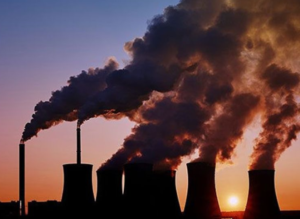
Mr Biden spoke in Massachusetts as a heatwave brings extreme weather to Europe and North America. Tens of millions of people in the US, across more than two dozen states, are living under heat warnings this week.
“Climate change is literally an existential threat to our nation and to the world,” the president said in Wednesday’s speech, which was delivered outside a former coal-fired power plant in the town of Somerset. “The health of our citizens and our communities is… at stake. So we have to act.”
The Reuters Institute said that alongside the rising number of people avoiding news is a drop in trust in reporting in the US to the lowest point yet recorded at just 26% of the population.
The United States hopes to see a global price cap on Russian oil introduced by December, U.S. Deputy Treasury Secretary Wally Adeyemo said on Wednesday. “We are following on what the Europeans have done,” he told the Aspen Security Forum in Colorado.
“They introduced the idea of looking to do a price cap but they also said by December, they plan to put in place their insurance ban. “Our goal is to make sure that as that insurance ban is going into place, we’re in a position where there’s a price cap that can be joined onto that that is a global one that helps to drive down global energy prices and also allows Russian energy to flow into the market place.”
Russia will not export oil to the world market if the price is capped below the cost of production, Interfax news agency quoted Deputy Prime Minister Alexander Novak as telling Russian television earlier.
Vladimir Putin believes the Russian military’s scaled-down attrition strategy in Ukraine will grind down Ukrainian forces and break the will of the U.S.-led alliance — but he is wrong, CIA Director William Burns said Wednesday at the Aspen Security Forum.
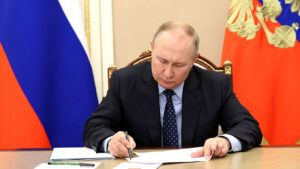
“Putin’s view of Americans is that we always suffer from attention deficit disorder, and we’ll get distracted by something else,” Burns said during a live-streamed interview with Andrea Mitchell of NBC News. “My own strong view is that Putin was wrong in his assumptions about breaking the alliance and breaking Ukrainian will before the war began, and I think he is just as wrong now.”

After a disastrous start to the war based on a series of flawed assumptions, Russia has settled into its traditional method of war in Ukraine’s eastern region, Burns said — directing massive artillery and air strikes against cities, without regard to civilian casualties (Red/many sources).





